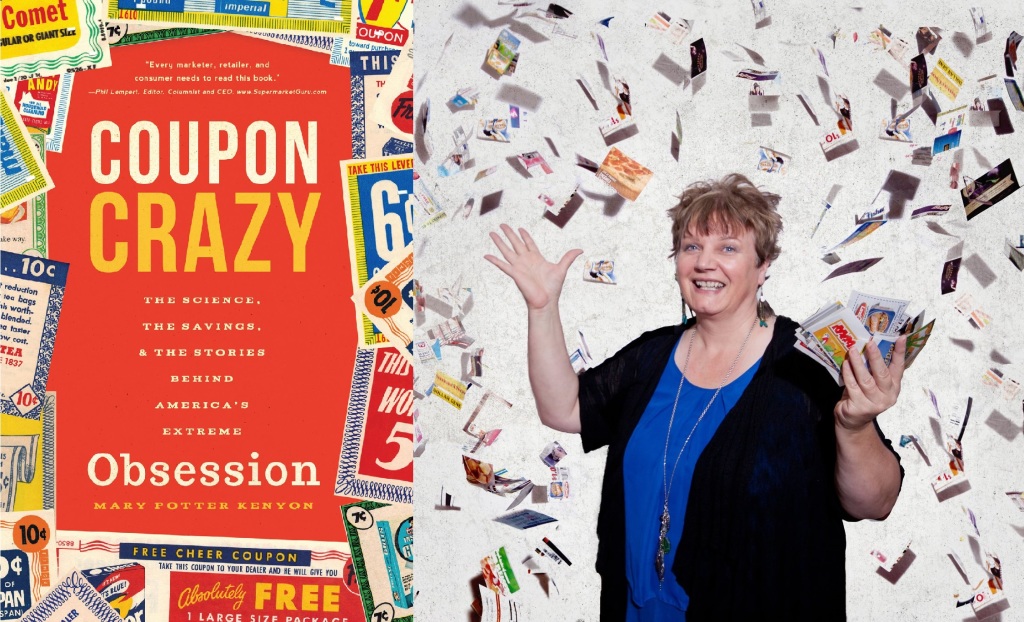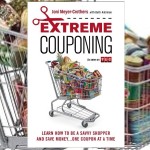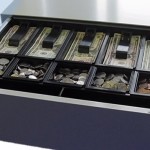The last thing the world needed, and the last thing Mary Potter Kenyon wanted to write, was another “how-to” coupon book. Because it’s not the “how”, but the “why” that has long fascinated her. Why did coupons first come into existence? Why do some marketers have a love-hate relationship with them? And why are some people drawn to, even obsessed with, coupons while others couldn’t care less about them?
The search for answers to those questions is what led Kenyon to write “Coupon Crazy”, a fascinating and entertaining new book that examines the culture of couponing. Part history lesson, part sociological study and part couponing memoir, the book, as its subtitle promises, aims to explore “the science, the savings and the stories behind America’s extreme obsession.”
And Kenyon is no couponing dilettante. As both a bona fide author with hundreds of published works to her name, and an actual couponer, Kenyon offers a book that’s a much better read than your typical ghost-written how-to book, and much more informed than one that a non-couponing author might produce. She not only knows her stuff, but she knows how to tell her tale using the unique vernacular of couponers (there’s a glossary for those poor souls who wouldn’t know a BOGO from a blinkie). And she has a psychology degree to boot – all the better to examine the couponing culture that she herself has decades of experience with.
“If I learned nothing more through the research and writing of this book, I learned that it isn’t all about the savings, really,” Kenyon told Coupons in the News. “The obsession of using coupons can go much deeper than that. It might be as simple as wanting to save money on groceries or as complex as couponing being something that appeals to a particular type of personality, or even that it is the natural ‘high’ couponers get from walking out of a store with bags full of ‘free stuff’.”
Kenyon weaves anecdotes about coupon history, marketing tactics and shopper psychology around stories from her own life as a couponer – and, back in the day, as a “refunder.” Long before “extreme couponing” entered our vocabulary, “refunding” was all the rage. Kenyon describes refunders “saving and neatly filing our trash”, in order to have box tops and UPC codes handy for mail-in rebates offering free products or cash back. That practice has since fallen out of favor, but those who participated at the time will see themselves in her stories.
Similarly, if you count yourself among the ranks of serious couponers, you’ll nod your head in recognition at many of the tales Kenyon tells, including the reactions she’s gotten from non-couponing friends who just don’t get it. “‘Crest toothpaste is on sale for $1, and Sunday’s newspaper has $1 coupons in it!’ I’d announce, brimming with excitement at the prospect of free toothpaste,” she writes. “‘I already have a tube of toothpaste,’ came the perplexed reply.”
“I admit I don’t get it,” Kenyon told Coupons in the News, about those who say coupons aren’t worth the trouble, or claim they’re too busy to use them. “Too busy to save money? Too busy to even look through the coupon inserts to see if there is something you are regularly purchasing that you might be able to save a dollar on? I have had women in the grocery store next to me reach over the boxes of crackers that have a $1 coupon attached so that they could get a box without a coupon on it. Really? Would they step over a dollar bill too?”
But it’s not all about the savings – as with any obsession, couponing can have a darker side. Kenyon explores various cases of coupon fraud over the years, including refunding conventions in which unscrupulous refunders would actually purchase and bring their own cash registers, in order to produce fraudulent receipts for mail-in rebates. She’s also not afraid to offer an unblemished look at her own obsession. She admits overdoing it herself, at times, with episodes of dumpster diving, chasing deals all over town, and buying things she didn’t need just for the “high”. She’s since toned down her more extreme practices, and like “Super-Couponing” founder Jill Cataldo, who writes the book’s forward, Kenyon thought better of taking part in the controversial “Extreme Couponing” series, and turned down offers from the producers to participate.
For the novice couponer, Kenyon’s book does offer a brief how-to guide at the end, along with a list of relevant books, articles, apps and online references (including a very kind mention of the very site you’re reading!) Plus, Kenyon adds, “I maintain that marketers should read this book so they can understand the mindset of the avid couponer, and that even those who have never used a coupon in their life will find this book entertaining.”
Kenyon wrote the book on her husband’s urging, and speaks fondly of his support and encouragement, if occasional puzzlement at her couponing obsession. He “never did quite figure it out, but was proud of my savings nonetheless,” she said. Sadly, as she relates in the book, he didn’t live to see it published – a reminder that there are some things more important in life than couponing.
So, yes, couponing can get extreme, and it can become an unhealthy obsession if you let it. But for Kenyon and millions of others, couponing is not a passing fad, but a way of life. “This is what I do,” she explains plainly in the introduction to the book. “My question: why doesn’t everyone?”
“Coupon Crazy” is published by Familius Publishing, and is available on the Familius website for $16.95, or on Amazon.com for just $13.10, or $7.69 for the Kindle edition. Because, as always – you wouldn’t pay full price for a book about couponing, would you?















this kind of “obsession” can destroy marriages.
So can being broke two sides of a nickel pick one.
Pingback: Enter to Win a Copy of Coupon Crazy! I'm Mentioned in the Book! - Cori's Cozy Corner